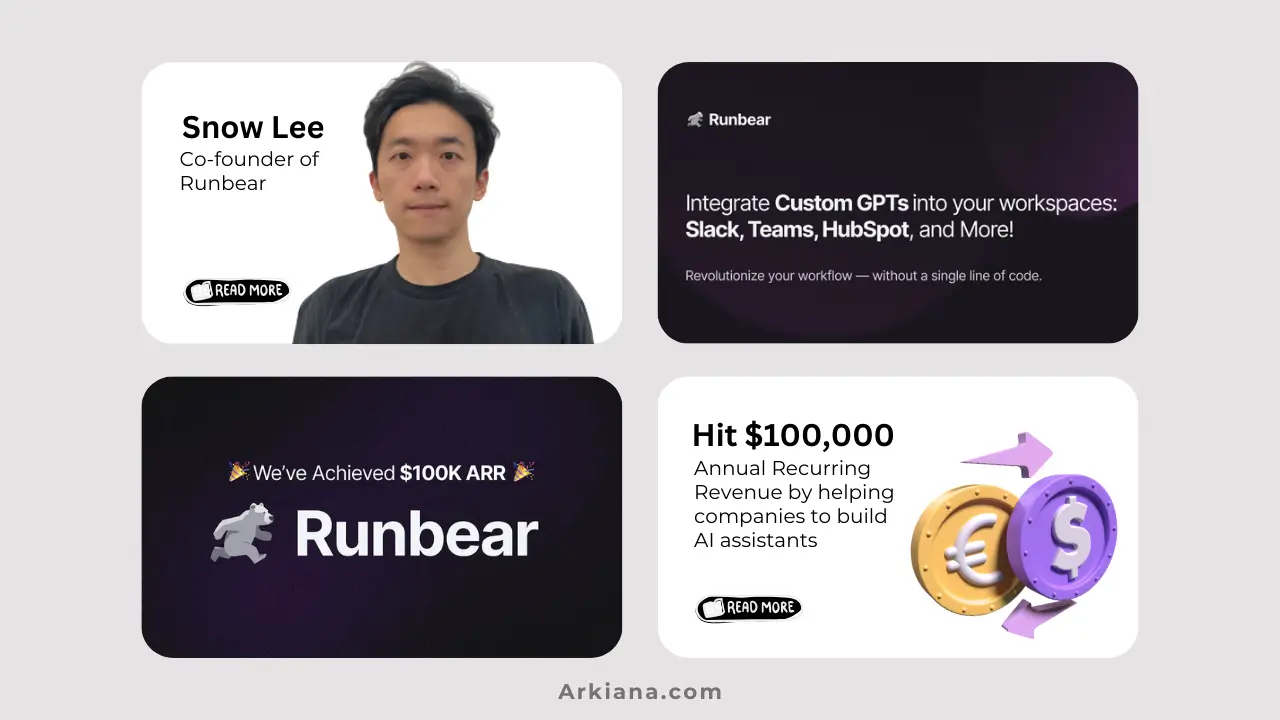Solopreneurship for Software Developers
Solopreneurship for Software Developers

Snow Lee, co-founder of Runbear, has built an impressive no-code platform that allows companies to integrate AI assistants into popular communication tools such as Slack, Microsoft Teams, HubSpot, and more.
Runbear enables businesses to create AI-driven assistants in under an hour without writing a single line of code.
The platform integrates seamlessly with AI models like OpenAI, Claude, and Gemini, empowering teams to boost productivity by automating daily tasks and enhancing communication within their tools.
At its core, Runbear offers a simplified way for organizations to leverage AI for everyday operations, allowing businesses to customize AI assistants that cater to their specific needs.
Runbear’s financial success speaks volumes about the demand for its product.
The platform has grown to reach $100,000 in ARR, a significant milestone for any SaaS.
With an MRR of $12,000, Runbear demonstrates that its product has recurring value, maintaining consistent revenue through subscription-based plans.
The growth in revenue has been driven by Runbear’s ability to serve both large and small businesses, helping them maximize their use of AI assistants without needing deep technical expertise.
Some notable companies that trust Runbear for their AI automation needs include SYPartners, Keep, Storykit, LaserAway, BCG, Loveholidays, and Matillion.
By offering a no-code platform, the company opened doors to customers who want to benefit from advanced AI integrations but lack the resources or skills to develop such tools from scratch.
Runbear’s marketing and distribution strategy is a mix of content marketing, social media engagement, outbound sales, and paid advertising.
These combined efforts have helped the platform gain traction and build a community of users who actively engage with its product.
Content Marketing: Runbear has leveraged content to educate its audience.
By publishing valuable tips, insights, and guides, they attract people interested in AI integration and automation.
The content serves as both an educational resource and a subtle sales pitch, demonstrating how Runbear can make workflows more efficient.
This approach not only builds trust but also showcases the platform’s value.
Social Media: Platforms like Medium, Reddit, and X (formerly Twitter) have played an important role in building Runbear’s community.
Social media posts about the product, its features, and use cases helped drive traffic and awareness.
Medium, for example, offers a space to write in-depth articles on how AI assistants can be integrated into different sectors, while Reddit allows for direct engagement with communities that might benefit from Runbear’s solutions.
Outbound Sales: Although outbound sales didn’t lead to as many sign-ups as they hoped, it surely brought in new users.
Paid Marketing: spending money on ads also didn’t bring in the results they were expecting. However, they successfully unlocked its potential by boosting performance sevenfold, reducing the CPC from $1.06 to $0.15.
There are many valuable lessons for other developers and SaaS founders to take away from Runbear’s journey:
Deliver Consistent Value: Runbear focuses on delivering a product that customers find useful from the start.
Their success lies in their ability to continuously provide value, allowing users to explore more features and create new use cases for their AI assistants.
For any SaaS platform, the key to long-term success is ensuring that users see the value of your product early on and continue to derive benefits as they grow.
Product-Led Growth (PLG) Works: PLG is a growth model that emphasizes letting the product drive customer acquisition and retention.
For Runbear, this approach has been successful because its platform is intuitive and powerful enough to sell itself.
Once users try the product, they see its value and are likely to continue using it, even recommending it to others.
Developers should consider adopting a similar approach by focusing on creating a product experience that encourages users to stick around.
Focus on One Strategy at a Time: In the fast-paced world of startups, it can be tempting to try multiple strategies at once to accelerate growth.
However, Runbear has learned that focusing on one key strategy at a time allows for more measurable results and a better understanding of what works.
For other developers, this is an important lesson—focus on one growth tactic, perfect it, and then move on to the next.
Runbear’s success in reaching $100,000/year in revenue with AI assistants offers valuable lessons in focus, product development, and marketing strategy.
By creating a no-code platform that empowers businesses to harness the power of AI, they have tapped into a growing market with immense potential.
The combination of product-led growth, consistent value delivery, and a well-rounded marketing approach has enabled Runbear to scale quickly.
You can follow Snow Lee’s journey on LinkedIn or you can try out Runbear here